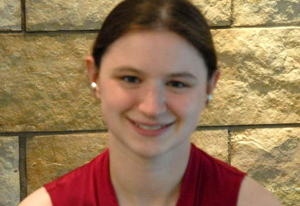 |
Karen Holly |
Established in 2001, the BRIN program was created to expose students to serious biomedical research, build a statewide biomedical research infrastructure between undergraduate and graduate institutions and to strengthen each undergraduate institution’s infrastructure and increase its capacity to conduct cutting-edge biomedical and behavioral research.
Today we meet Karen Holly, a sophomore majoring in bioinformatics at the University of Nebraska at Omaha.
What should we know about you?
I’m just a regular, everyday, normal girl from the country. My favorite author is Ayn Rand and I still watch cartoons (My favorite is Pinky and the Brain).
What or who influenced your interest in science?
My dad influenced my interest in science the most. He always encouraged me to ask questions and to be curious about everything.
What is it about science that excites you?
Science is exciting because it allows you to see how everything is connected and how everything works. It presents pieces of the world to you as puzzles, and once those puzzles are solved, then you can apply what you’ve learned to improving some aspect of life or living.
Will you pursue a career in science? If so, what do you hope to accomplish?
It’s very likely I will pursue a career in science, and though I’m not entirely sure what part of science I’ll work in, I just want my work to have some real world application that helps real people.
Why is it important to have programs like INBRE?
Programs like INBRE are very important because they give students the opportunity to decide if a career in research is right for them. And by giving these wonderful opportunities, it encourages other students to consider a career in research, when they might otherwise have not.